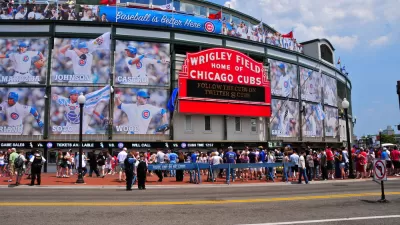Joel Kotkin once again leaps to the defense of the suburbs as a choice, and says that urbanists who are hoping that Americans will rush back into the cities are sadly mistaken.
"While millions of American families struggle with falling house prices, soaring gasoline costs and tightening credit, some environmentalists, urban planners and urban real estate speculators are welcoming the bad news as signaling what they have long dreamed of -- the demise of suburbia.
In a March Atlantic article, Christopher B. Leinberger, a visiting fellow at the Brookings Institution and a professor of urban planning, contended that yesterday's new suburbs will become "the slums" of tomorrow because high gas prices and the housing meltdown will force Americans back to the urban core. Leinberger is not alone. Other pundits, among them author James Howard Kunstler, who despises suburban aesthetics, and New York Times columnist Paul Krugman, see the pain in suburbia as a silver lining for urban revival.
Not so fast. The "out of the suburbs, back to the city" narrative rests more on anecdote than demographic or economic fact. Yes, high gas prices and rising sub-prime mortgage defaults are hurting some suburban communities, particularly newly built ones on the periphery. But the suburbs remain home to a majority of Americans and a larger proportion of U.S. families -- and people aren't leaving those communities in droves to live in cities. Even with economic growth slowing, many suburbs, exurbs and smaller towns, especially those whose economies are tied to energy, are continuing to do better than most cities in terms of job creation and population growth."
FULL STORY: Suburbia's not dead yet

Alabama: Trump Terminates Settlements for Black Communities Harmed By Raw Sewage
Trump deemed the landmark civil rights agreement “illegal DEI and environmental justice policy.”

Planetizen Federal Action Tracker
A weekly monitor of how Trump’s orders and actions are impacting planners and planning in America.

How Atlanta Built 7,000 Housing Units in 3 Years
The city’s comprehensive, neighborhood-focused housing strategy focuses on identifying properties and land that can be repurposed for housing and encouraging development in underserved neighborhoods.

In Both Crashes and Crime, Public Transportation is Far Safer than Driving
Contrary to popular assumptions, public transportation has far lower crash and crime rates than automobile travel. For safer communities, improve and encourage transit travel.

Report: Zoning Reforms Should Complement Nashville’s Ambitious Transit Plan
Without reform, restrictive zoning codes will limit the impact of the city’s planned transit expansion and could exclude some of the residents who depend on transit the most.

Judge Orders Release of Frozen IRA, IIJA Funding
The decision is a victory for environmental groups who charged that freezing funds for critical infrastructure and disaster response programs caused “real and irreparable harm” to communities.
Urban Design for Planners 1: Software Tools
This six-course series explores essential urban design concepts using open source software and equips planners with the tools they need to participate fully in the urban design process.
Planning for Universal Design
Learn the tools for implementing Universal Design in planning regulations.
Caltrans
Smith Gee Studio
Institute for Housing and Urban Development Studies (IHS)
City of Grandview
Harvard GSD Executive Education
Toledo-Lucas County Plan Commissions
Salt Lake City
NYU Wagner Graduate School of Public Service





























